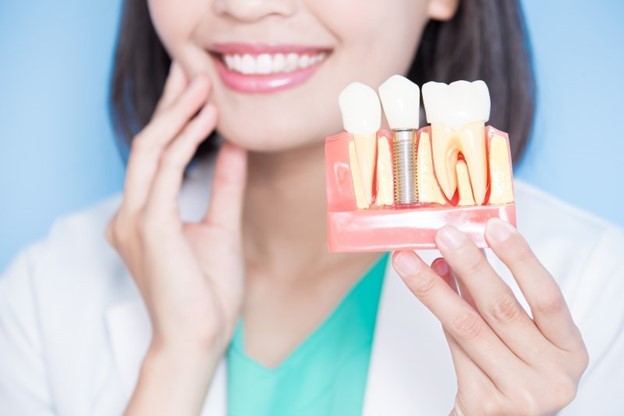
Dental implants serve as artificial tooth roots, offering a durable and long-lasting solution for replacing missing teeth. With proper care, they can provide a strong bite force that can endure for many years. While tooth enamel is the strongest material in the human body, it can still be susceptible to damage. Surprisingly, dental implants can surpass the strength of natural enamel, so keep reading as we explore the reasons behind their exceptional strength.
Are Dental Implants Stronger Than Your Natural Teeth?
The comparison between dental implants and natural teeth in terms of strength is complex. While dental implants can last over 30 years or even a lifetime without cracking or breaking and are also immune to tooth decay, it is not straightforward to directly compare them to natural teeth.
Both have their unique attributes and strengths, making the comparison more intricate than a simple yes or no answer. Despite their high resilience, dental implants can still experience cracking, much like natural teeth.
However, the likelihood of this occurrence varies depending on the specific component of the implant. Providing a detailed answer requires a comprehensive understanding of how dental implants function and interact with the surrounding structures.
What Parts of Dental Implants Are Strongest?
Modern dental implants consist of three key components: the post, abutment, and crown. Among these, the titanium-made post is the sturdiest, as it undergoes osseointegration, integrating firmly with the jawbone, providing exceptional strength and stability.
Following the post, the titanium abutment is the second strongest element, also exhibiting high resilience to damage. Together, these components create a robust foundation for dental implants, offering long-lasting support and functionality.
While the crown of a dental implant, typically made of porcelain, can closely mimic the strength of a natural tooth, it remains susceptible to damage from excessive pressure or chronic teeth grinding. Proper care and avoidance of excessive force are crucial to ensure the longevity and integrity of the implant crown.
How to Keep Your Dental Implant
To ensure the long-term success of your dental implants, it’s essential to take proper care of them, despite their strength surpassing that of your natural teeth. Here’s how you can achieve this:
- Practicing good oral hygiene – To achieve this, make sure to brush your teeth twice a day and floss nightly.
- Avoid chewing on hard objects – Avoid subjecting the crown or other implant restoration to hard foods or objects, such as chewing on ice or hard candy, as it can lead to damage.
- Use a mouthguard – Prevent damage to your dental implants as well as the adjacent teeth by refraining from teeth grinding or jaw clenching, also called bruxism.
- Visit your dentist regularly – To maintain the implant’s health, going to biannual checkups and cleanings are essential.
- Avoid smoking – Refraining from smoking or using other tobacco products can reduce the chances of implant failure.
- Keep your dentist updated – To prevent further damage, promptly inform your dental professional about any changes or issues you have with your implant.
About Our Practice
At The Dental Center of Lakewood, our dedicated team provides comprehensive dental care to patients in Dallas and other DFW communities, offering dental implants to stabilize and enhance their smiles. Combining state-of-the-art technology with a compassionate approach, our adept team delivers personalized care. With years of experience in providing exceptional dental treatment, our expert periodontist ensures the highest quality care. To learn more about dental implants or to schedule an appointment, call Dental Center of Lakewood at (214) 823-5253 or visit our website.
